Losing weight can seem daunting, but it doesn’t have to be. With simple diet, exercise, and lifestyle changes, you can safely and effectively shed excess pounds and achieve your weight loss goals.
This guide will share 100+ proven strategies that also help me lose weight and maintain a healthy life.
Losing even a small amount of weight can have huge health benefits. Weight loss can boost your energy, improve physical mobility, and increase self-confidence.
Whether you are looking to lose 5 pounds or 50 pounds, implementing some of the diet, exercise, and lifestyle tips in this guide will put you on the path to success.
This weight loss guide gives you many practical tips for changing your nutrition, fitness, and daily habits.
Ready to get started? Let’s begin!
- Diet and Nutrition
- Exercises And Activity
- Best Habits That Help You To Lose Weight
- Natural Supplements
- Office Activities

- Diet and Nutrition To Lose Weight
- 1. Boost Metabolism with Protein
- 2. Prioritize whole, Unprocessed Foods
- 3. Find Your Balance with Portion Control
- 4. Say No to Sugary Temptations
- 5. Make Fiber Your Friend
- 6. Add Healthy Fats In Your Diet
- 7. Try the 80-20 Rule To Loss Weight
- 8. Limit Refined Carbohydrates
- 9. Stay Hydrated and Flush Out Excess Toxins
- 10. Mindful Eating for a Mindful Life
- 11. Diversify Your Plate for Optimal Nutrition and Flavor
- 12. Expose Hidden Sugars for Hidden Health Benefits
- 13. Add Probiotics To Your Diet for Improved Gut Health
- 14. Avoid Late Night Snacking for Restful Sleep and a Slimmer You
- 15. Stay On Track With Meal Planning
- 16. Limit Sodium Intake
- 17. Boost Metabolism with Spices and Herbs
- 16. Meal Timing
- 17. Add More Plant-Based Food In Diet
- 18. Mind the Coffee Additives
- 19. Maximize Nutrition in Every Bite
- 20. Green Tea: A Natural Fat Burner and Antioxidant
- 21. Smoothies Quick Fix to Daily Nutrition
- 22. Herbal Teas Calorie-Free Way to Stay Hydrated
- 25. Opt for Smaller Plates To Reduced Calorie Intake
- 26. Listen for Hunger Cues and Avoid Overeating
- 27. Suppress Appetite with Apple Cider Vinegar
- 27. Eat Breakfast Like a King, Lunch Like a Prince, and Dinner Like a Pauper
- 28. Speed Up Fast Lose With Intermittent Fasting
- 29. Avoid Crash Diet For Better Health
- 30. Curb Cravings with Nutrient-Packed Nuts and Seeds
- 31. Curb Your Sweet Tooth Naturally
- 32. Healthy Soup: A Nutritious and Satisfying Way to Lose Weight
- Exercises And Activity To Lose Weight
- 1. Accelerate Fat Loss Through Regular Exercise
- 2. Do High-Intensity Interval Training (HIIT) To Maximum Calorie Burn
- 3. Do Strength Training To Build Muscle Mass
- 4. Find An Exercise Buddy for Accountability and Motivation
- 5. Burn Extra Calories by Staying Active Throughout the Day
- 6. Walk Your Way to a Healthier You
- 7. Do Cardio for a Strong Heart and a Slim Waist
- 8. Do Yoga for Improved Flexibility and Mind-Body Connection
- 9. Join a Dancing Class for Fun and Effective Cardio
- 10. Start Swimming for Low-Impact Cardio and Full-Body Workout
- 11. Commit To a Set Amount of Time To Achieve a Healthy Body
- 12. Do Compound Exercises: Best Way to Build Muscle and Burn Fat
- 13. Fuel Your Body Before and After Workouts
- 14. Avoid Overtraining to Prevent Injuries and Burnout
- Lifestyle Changes To Speed Up Lose Weight
- 1. Get Sufficient Sleep for Improved Energy, Mood, and Weight Loss
- 2. Start Your Day With Water
- 3. Think Before Eating To Make Mindful Choices
- 4. Manage Stress Levels
- 5. Stay Positive for Improved Motivation and Mental Health
- 6. Breathe Deeply for Full-Body Health Benefits
- 7. Limit Alcohol Intake to Reduce Empty Calories
- 8. Avoid Frying the Food
- 9. Don’t Be Couch Potato
- 10. Stand Up And Walk To Reduced Sedentary Behaviour
- 11. Burn Extra Calories by Using Stairs Over Escalators
- 12. Quit Smoking to Improve Your Lung Health
- 13. Dine Early for Better Digestion and Restful Nights
- 14. Cut Down Artificial Sweeteners To Improve Gut Health
- Best Habits That Help You To Lose Weight
- 1. Create a Smart Grocery List for Healthier Choices
- 2. Do Meal Planning To Staying on Track and Eat Nutritious Meals
- 3. Avoid Impulse Snacks by Planning Ahead
- 4. Have Occasional Treats to Satisfy Cravings and Stay Motivated
- 5. Journaling Can Help You Track Your Progress, Identify Triggers
- 6. Conquer Cravings with Healthy Alternatives
- 7. Drink Your Coffee Black
- 8. Embrace Patience for Lifelong Wellness
- 9. Transform Your Mindset, Transform Your Health
- 10. Stay Consistent With Your Plan
- 11. Make Informed Choices by Reading Labels
- 12. Plan a SMART Goal for Clear Direction and Motivation
- 13. Make It Fun and Enjoyable
- 14. Use Tools and Gadgets to Help You To Lose weight
- 15. Stay Motivated by Celebrating Small Victories
- 16. Stop Making Excuses and Take Charge of Your Health
- 17. Ask yourself why you’re eating
- Natural Supplements That Can Help To Lose Wight
- 1. Caffeine: Boost Your Metabolism and Improve Your Exercise Performance
- 2. Accelerate Fat Burning with Green Tea Extract
- 3. Capsaicin for Enhanced Calorie Burning
- 4. Target Stubborn Fat with Forskolin
- 5. Conjugated Linoleic Acid (CLA)
- 6. How Vitamin B-Complex Fuels Your Day
- 7. Regulate Hunger Hormones with Vitamin D
- 8. Reduce Fat Storage with Vitamin C
- 9. Vitamin E: Protect Against Cell Damage, Reduce Inflammation
- 10. Magnesium: A Natural Muscle Relaxant and Energy Booster
- 11. Boost Energy and Prevent Anemia with Iron
- Office Activities That Help To Lose Weight
- 1. Boost Productivity with an Ergonomic Setup
- 2. Lunch Break Walk for Improved Energy and Weight Loss
- 3. Set Water Reminders for Regular Hydration
- 4. Posture Check for Reduced Pain and Improved Confidence
- 5. Team Up for Health: Join Office Sports Teams
- 6. Burn Calories and Strengthen Legs by Stair Climbing
- 7. Healthy Snacking for Improved Nutrition and Reduced Cravings
- 8. Relieve Tension with Desk Yoga Techniques
- 9. Using Standing Desk To Improve Circulation
- 10. Bike to Work To Improve Cardio Health
- 11. Walk and Talk
- 12. Opt for Walking Meetings
- Conclusion
- References
Diet and Nutrition To Lose Weight
The cornerstone of any successful weight loss journey is eating right. A healthy diet gives your body the important nutrients it needs to work well. It also helps your body burn fat faster.
Watching what you eat is one of the best ways to successfully lose weight. Some diets may help you lose weight in less time, but they will actually cause more problems than benefits. So, it’s time to start eating well.
1. Boost Metabolism with Protein
Increased protein intake can help you achieve your weight loss goals. It helps you feel full for longer, which reduces the need for unnecessary snacking.
It is also essential for muscle repair and growth, especially if you combine your diet with a workout regimen.
One study has shown that people consume over 400 fewer calories daily with a high-protein diet. Good protein sources include lean meat, poultry, fish, beans, lentils, tofu, nuts, and seeds.
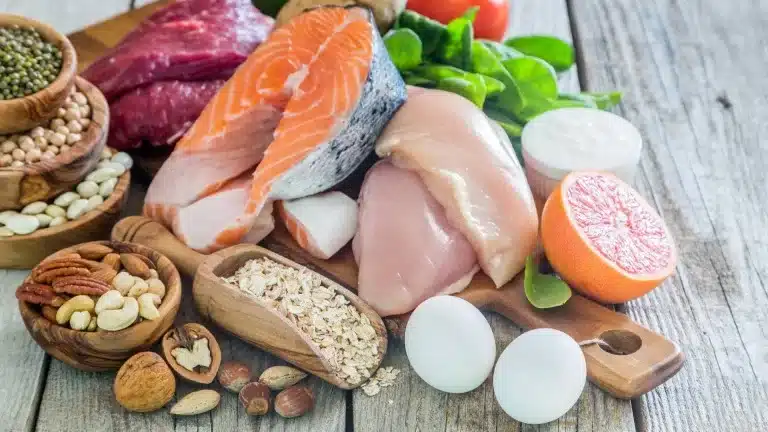
2. Prioritize whole, Unprocessed Foods
Whole foods, whether they be fruits, vegetables, grains, or lean meats, are packed with essential nutrients and are free of unnecessary additives.
Choosing foods that haven’t been processed means you’re giving your body good fuel and reducing the amount of empty calories.
Limit their intake of sugary drinks and processed foods.
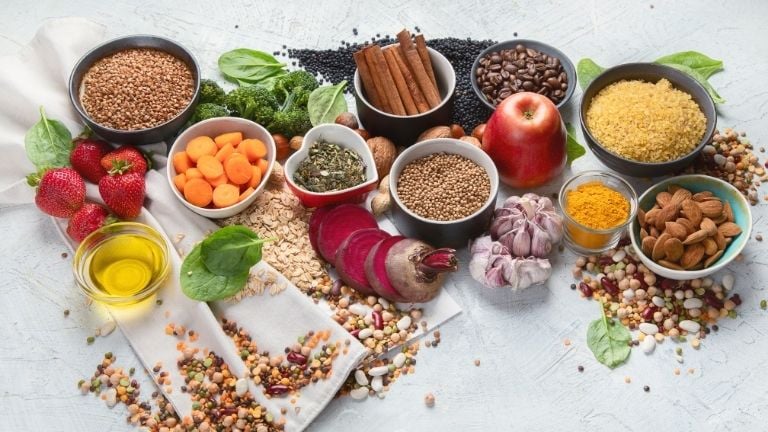
3. Find Your Balance with Portion Control
It’s not just what you eat but how much you eat. Overeating, even the healthiest foods, can slow your weight loss process.
You can enjoy a diverse range of foods without overindulging by being mindful of portion sizes.
You can control your portions by using smaller plates, eating slowly, and avoiding distractions while you’re eating.
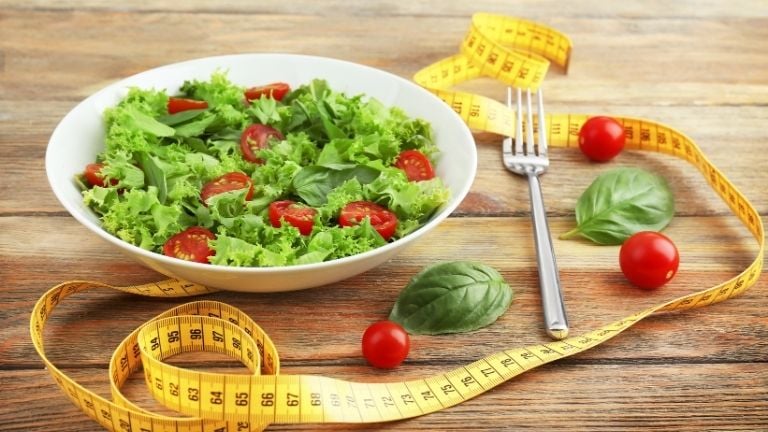
4. Say No to Sugary Temptations
Sugary drinks, including many store-bought juices, sodas, and even some teas and coffees, can be a significant source of calories.
It’s tough to figure out how much sugar a product actually has since sugar has so many different names in ingredient lists. Try to avoid eating packaged foods.
You can drastically reduce your daily caloric intake by replacing them with water, herbal teas, or infused water.
One study found that kids are 60% more likely to become obese if they drink sugary drinks every day.

5. Make Fiber Your Friend
Vegetables, fruits, whole grains, beans, and nuts are fiber-rich, making you feel full faster.
Studies have shown that fiber helps with digestion, keeps you full, and helps reduce belly fat.
A study has shown that eating soluble fiber reduces the amount of hunger hormones the body makes, like ghrelin. Others have shown that soluble fiber increases the production of hormones that make you feel full, like cholecystokinin, GLP-1, and the peptide YY.
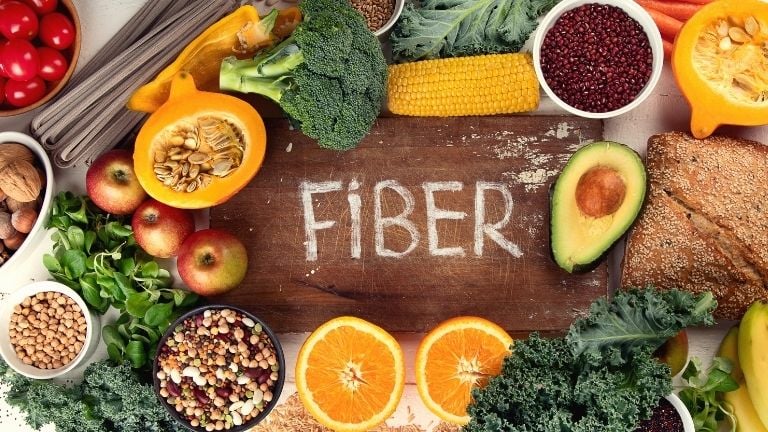
6. Add Healthy Fats In Your Diet
Not all fats are created equal. Focusing on healthy unsaturated fats instead of trans and saturated fats can help you shed pounds.
Foods like olive oil, avocados, nuts, seeds, and fatty fish provide essential fatty acids that boost metabolism, reduce inflammation, and help you feel full.
A study has shown that eating healthy fats with vegetables and lean protein also makes you feel fuller.
All fats are calorie-dense, so be mindful of portion sizes. Limit saturated fats from red meat and processed foods, but don’t fear healthy fats.
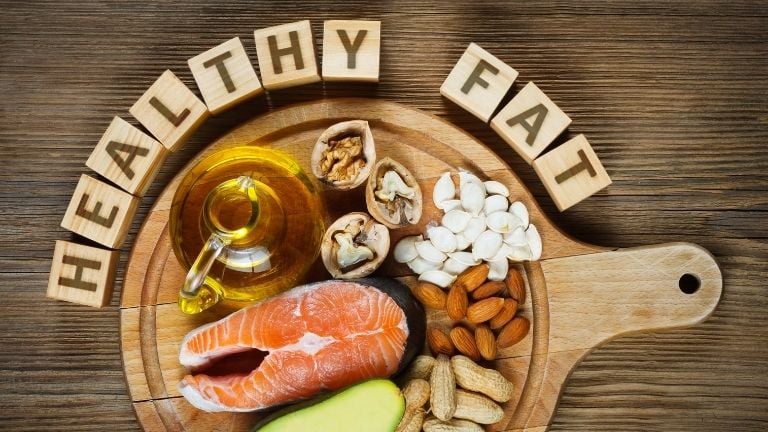
7. Try the 80-20 Rule To Loss Weight
Like many of us who are conditioned to eat until we are full or even stuffed, residents of Okinawa, Japan, practice a habit called hara hachi bu, where they intentionally stop eating when they feel about 80% full.
This principle entails eating until one is only moderately satisfied.
According to eating behavior expert Dr. Brian Wansink, adopting a similar habit of eating until you are 80% full can be an effective weight loss strategy.
To practice the 80-20 rule, listen to your body’s hunger signals and stop eating when you feel slightly satisfied instead of full. Eat slowly, chew thoroughly, and pause periodically to assess your fullness.
With this simple change, you can easily cut calories without feeling hungry.

8. Limit Refined Carbohydrates
Refined grains like white bread, pasta, rice, and baked goods can sabotage weight loss efforts. They are digested quickly and can spike blood sugar, which can increase the risk of cravings, overeating, and disease. They also lack the fiber found in whole grains, which promotes satiety.
You can reduce your calories by eating less sugar, white flour, processed foods, and refined carbohydrates.
All carbs are not created equal. Choose complex carbs over refined carbs to feel fuller for fewer calories. Focus on eating fruits, vegetables, legumes, beans, and whole grains like brown rice, quinoa, and oats.
Our free weight loss calculator will help you determine your calories requirements to lose weight.
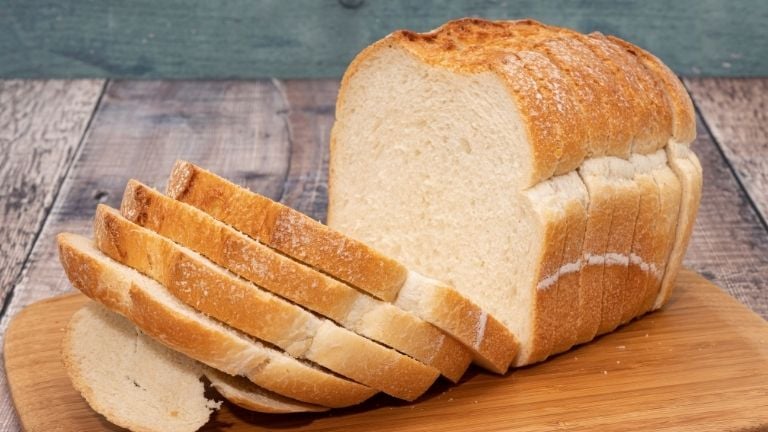
9. Stay Hydrated and Flush Out Excess Toxins
Water isn’t just for quenching thirst; it’s an underrated tool for weight loss. Drinking water can help you lose weight by suppressing your appetite and boosting your metabolism.
Water is especially helpful for weight loss when it replaces other drinks that are high in calories and sugar.
Drink plenty of water throughout the day. You should aim to drink at least 8 glasses of water per day.
You can also add lemon or mint to your water to enhance its flavor.

10. Mindful Eating for a Mindful Life
Enjoy your meals instead of eating on the go or in front of a screen. This practice can help you recognize fullness cues and enjoy the flavors more, reducing the chances of overeating.
Research has shown that mindful eating can be an effective strategy for weight loss, reducing binge eating, and improving eating behaviors
To eat more mindfully, avoid distractions such as TV or phones when eating. Listen to your body’s cues about hunger and fullness, and stop eating when you’re full, not overstuffed.
Chew thoroughly and enjoy the food textures and flavors. Notice when the body feels satisfied rather than over-full.
11. Diversify Your Plate for Optimal Nutrition and Flavor
A colorful plate filled with various fruits and vegetables can lead to a healthier, more nutrient-dense diet that supports weight loss.
Different fruits and vegetables have a lot of vitamins, minerals, antioxidants, and phytonutrients that boost immunity, fight disease, and aid in weight management. Studies have shown that diets high in fiber from fruits, vegetables, and whole foods improve health status.
To make your plate more diverse, try different fruits and veggies every week, like berries, citrus fruits, melons, leafy greens, cruciferous veggies, and root veggies, for a different taste.

12. Expose Hidden Sugars for Hidden Health Benefits
Hidden sugars are a major contributor to weight gain. Many foods and beverages contain it, even those marketed as healthy or natural.
It is important to read nutrition labels carefully – ingredients like cane sugar, high fructose corn syrup, sucrose, dextrose, and more indicate added sugars. Limiting sugary drinks, desserts, and snacks is important.

13. Add Probiotics To Your Diet for Improved Gut Health
Probiotics have been shown to have several health benefits, including improved digestion, stronger immunity, and reduced inflammation. Some research has also suggested that probiotics may help with weight loss.
Eat fermented foods regularly. Fermented foods are a good source of probiotics. A few examples of fermented foods are yogurt, kimchi, sauerkraut, and kefir.
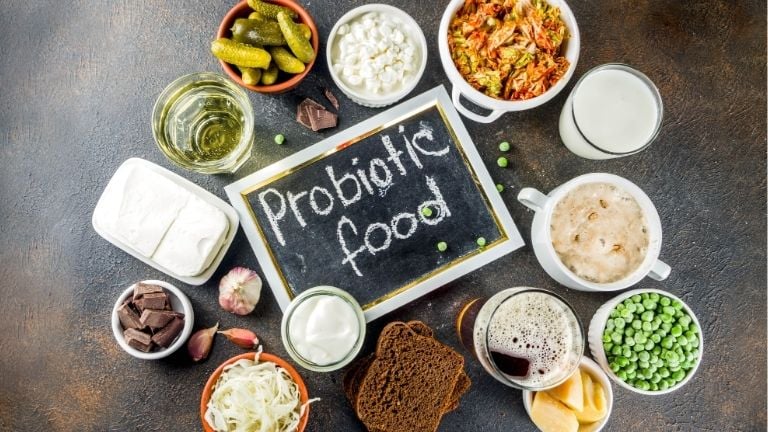
14. Avoid Late Night Snacking for Restful Sleep and a Slimmer You
Eating just before bed can lead to weight gain. It can consume unnecessary calories and derail your weight loss progress.
A study found that late-night eating is associated with an increased risk of obesity and increased body fat.
This puts fat burning on hold for 7-8 hours, which makes it more likely to be stored as extra weight. Late-night snacking can also spike blood sugar levels and make it difficult to fall asleep.
Eat healthy snacks like fresh fruit, yogurt, nuts, or whole grain crackers if hunger strikes at night.

15. Stay On Track With Meal Planning
Meal planning prevents last-minute unhealthy food choices. Prepare a weekly menu focusing on balanced meals, and stick to it.
Meal planning leads to more thoughtful food choices, appropriate portions, and better nutrition. With an arsenal of healthy go-to meals ready to enjoy each week.
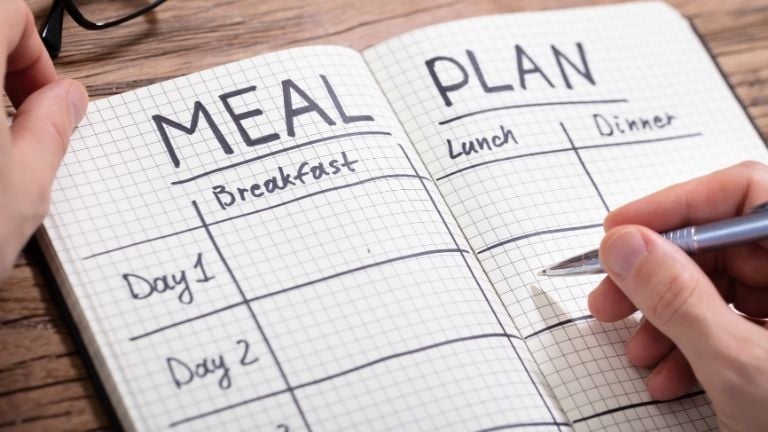
16. Limit Sodium Intake
Reducing sodium intake can help shed excess water weight and reduce bloating.
The American Heart Association recommends that adults consume no more than 2,300 mg of sodium per day. However, most Americans consume more than that, averaging around 3,400 mg per day.
Opt for fresh foods over canned or processed ones, and use herbs and spices for flavoring instead of salt.
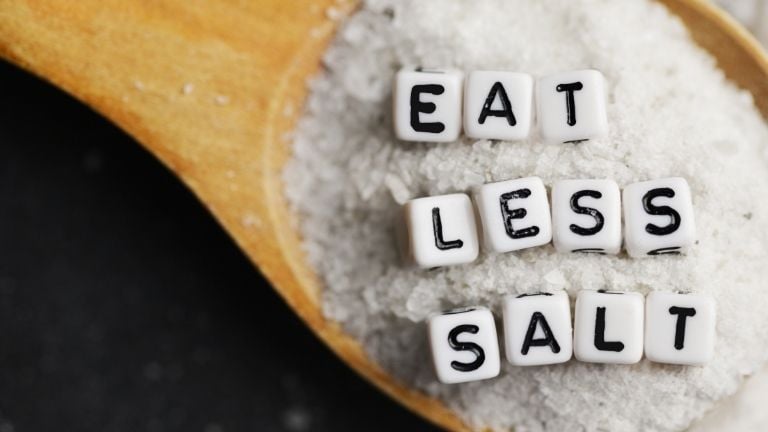
17. Boost Metabolism with Spices and Herbs
Adding more spices to your diet can help boost your metabolism and support weight loss. Spices can also help to improve digestion, reduce inflammation, and regulate blood sugar levels.
Some of the most popular spices and herbs are listed below.
- Cayenne pepper can help increase your body’s ability to burn fat and calories by stimulating body heat.
- Ginger promotes digestion and increases metabolism.
- Cinnamon boosts metabolism, improves digestion, and helps regulate blood sugar levels.
- Fenugreek: may help control appetite and reduce food intake.
- Ginseng reduces appetite and increases metabolism.

16. Meal Timing
Several studies over the past decade have shown that eating late meals might make it harder to lose weight.
A small study found that eating the first meal at 9 a.m. and the last meal at 5 p.m. led to more weight loss than eating the first meal at noon and the last meal at 8:30 p.m.
Another study found that people who ate dinner at least four hours before bed lost more weight than those who ate dinner closer to bedtime.

17. Add More Plant-Based Food In Diet
In 2022, a Dutch study showed that overweight people lost, on average, 16 pounds by eating mostly plant-based products for three months. The study was presented at the European Congress on Obesity.
The European Heart Journals 2023 article examined research studies published between 1980 and October 2022 to examine the effects of plant-based diets on risk factors for cardiovascular disease. The article found that vegetarian and vegan diets reduce total cholesterol and low-density lipoprotein cholesterol.
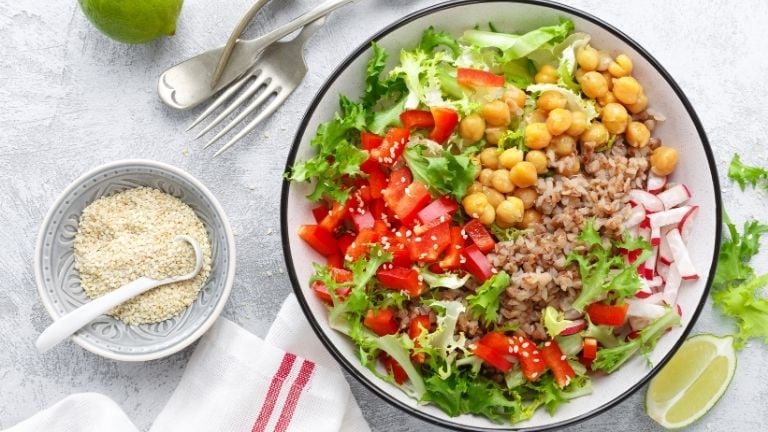
18. Mind the Coffee Additives
Coffee is one of the world’s most popular beverages. It’s a natural source of caffeine, antioxidants, and nutrients
Coffee can be a healthy way to start the morning, but added calories from cream, sugar and flavored syrups can interfere with weight loss.
Adding a tablespoon of cream or milk and a teaspoon of sugar can significantly increase the calorie count. Flavored lattes are liquid desserts with a lot of sugar. Black coffee or plain espresso are the most waistline-friendly options
Research shows that 0.9-2.7 mg of caffeine per pound of body weight improves workout performance. Coffee for 45-60 minutes before you workout helps the caffeine hit its peak when you work out.

19. Maximize Nutrition in Every Bite
Instead of counting calories, focus on the nutrient density of foods. Eating foods that have lots of vitamins, minerals, and other good things will make you feel better and help you in the long run.
Choose whole, unprocessed foods, such as fresh fruits and vegetables, whole grains, legumes, and over-processed options.
20. Green Tea: A Natural Fat Burner and Antioxidant
Green tea is full of health benefits and contains antioxidants and healthy compounds. GT has no calories, which helps boost metabolism and improve your body’s efficiency for burning energy.
A 12-week study published in 2012 observed a catechin-enriched green tea beverage significantly reduces visceral fat in humans.

21. Smoothies Quick Fix to Daily Nutrition
Besides promoting weight loss, smoothies have a number of additional health benefits. One of the benefits of smoothies is that they can help detoxify the body.
Unlike juices, smoothies retain the fiber of fruits and vegetables, which safeguards our bodies against toxins by boosting antioxidants and increasing the activity of enzymes that clear off and neutralize free radicals.
Research shows that it is good to add smoothies to your diet to eliminate the harmful waste material that builds up between your tissues and clean your blood.
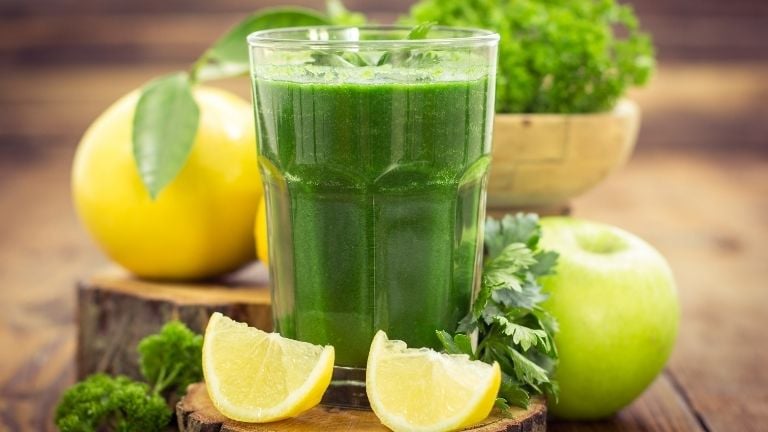
22. Herbal Teas Calorie-Free Way to Stay Hydrated
Herbal teas are made by infusing herbs, spices, and fruits in hot water and are naturally caffeine-free. The most widely consumed varieties include rooibos, ginger, rosehip, and hibiscus tea.
Some studies suggest that herbal teas may help reduce weight and lose fat.
Herbal teas can provide additional health benefits, such as increasing metabolism, detoxifying the body, and suppressing appetite.

25. Opt for Smaller Plates To Reduced Calorie Intake
A simple trick to control portions is using smaller plates. It gives the illusion of a full plate, leading to reduced food intake.
Even though smaller plates may not be a perfect way to lose weight, they can be helpful when combined with other healthy habits, such as mindful eating and regular exercise.

26. Listen for Hunger Cues and Avoid Overeating
Hunger cues are signals your body sends when it needs energy from food. They can be physical, like a growling stomach or low energy, or psychological, like thinking about food or feeling angry.
Eat when you’re hungry and stop when you’re satisfied. It sounds simple, but paying attention to your body’s signals can significantly impact weight loss.
27. Suppress Appetite with Apple Cider Vinegar
It is widely believed that apple cider vinegar (ACV) can aid in weight loss by enhancing satiety, stabilizing blood sugar levels, and enhancing metabolism.
However, the research on its effectiveness is mixed. Some studies say that apple cider vinegar may help you lose weight, but others have found little evidence to support this claim.
According to this study, adding 1 or 2 teaspoons of apple cider vinegar to your diet may help you lose weight.
ACV should be consumed in moderation, as excessive consumption can lead to negative side effects such as tooth enamel erosion and throat irritation.

27. Eat Breakfast Like a King, Lunch Like a Prince, and Dinner Like a Pauper
A popular saying suggests consuming more calories earlier in the day. Some studies suggest that eating a larger breakfast and a smaller dinner may lead to weight loss.
Interestingly, the study also found that eating the main meal too late, after 3 p.m., was associated with more difficulty losing weight.

28. Speed Up Fast Lose With Intermittent Fasting
Intermittent fasting (IF) is an eating pattern that cycles between periods of fasting and eating. It is not a diet in the traditional sense but rather a way of scheduling your meals.
There are several approaches to IF, including alternate-day fasting, 5-2 fasting, and daily time-restricted fasting.
Research suggests that fasting for a short time can produce ketosis, which is a process that occurs when the body doesn’t have enough glucose for energy, so it breaks down stored fat instead.
Along with losing weight, intermittent fasting may help lower cholesterol and blood sugar levels, which may help reduce risk factors for health conditions like diabetes and cardiovascular disease.

29. Avoid Crash Diet For Better Health
It is best to avoid crash diets, which involve consuming fewer than 1,200 calories per day for women or 1,800 calories per day for men.
Even though crash diets may initially lead to weight loss, they are detrimental to your metabolism and overall health. These diets often lack essential nutrients and can cause muscle loss, ultimately slowing your metabolism.
To achieve long-term success, it is important to prioritize balanced nutrition and sustainable weight loss methods.
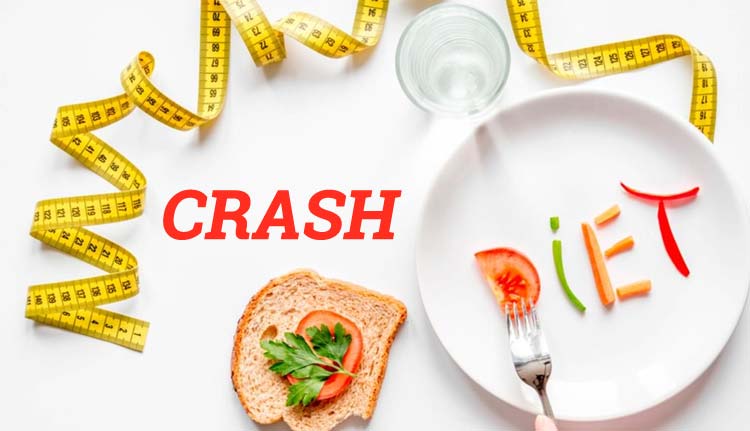
30. Curb Cravings with Nutrient-Packed Nuts and Seeds
Nuts and seeds are packed with protein, fiber, and healthy fats, which promote satiety and reduce hunger. Some nuts can slightly boost metabolism due to their protein and fat content.
Some of the best nuts and seeds for weight loss include almonds, cashew nuts, Brazil nuts, flax seeds, pumpkin seeds, pistachios, and walnuts. However, eating them in moderation is important because they’re high in calories.
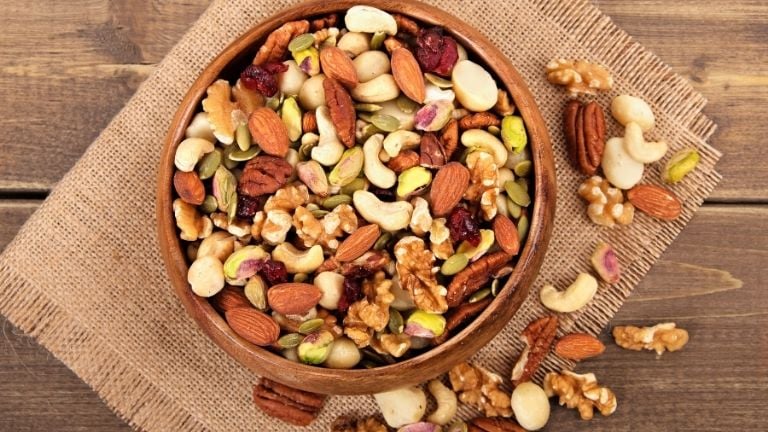
31. Curb Your Sweet Tooth Naturally
Sugary treats like candy, cakes, and cookies are certainly delicious but have little nutritional value and can negatively impact health.
However, it is unrealistic to completely eliminate sweet flavors from your diet. The key is obtaining natural sweetness from healthy whole foods like fruits.
Fruits like apples, berries, melons, peaches, and pineapple can satisfy a sweet tooth. Dry fruits like raisins, apricots, and dates are also options, but they should be eaten in moderation due to their higher calorie and sugar density.

32. Healthy Soup: A Nutritious and Satisfying Way to Lose Weight
It’s understandable to crave a hot, tasty meal at the end of a long day. But turning to processed, ready-to-eat foods that are high in fat, salt, and preservatives is a bad habit that can make it hard to lose weight.
For example, make a big pot of vegetarian bean soup loaded with veggies like carrots, spinach, tomatoes, onions, and peppers. It’s also a good source of fiber, which can help you feel full and satisfied. Plus, it’s a delicious and easy meal to make
According to research, people who start their meal with a bowl of broth-based soup eat fewer calories overall than those who don’t.

Exercises And Activity To Lose Weight
To lose weight, you have to burn more calories than you eat. While your diet is important, exercise and activity levels also greatly create a calorie deficit.
To lose weight at a healthy pace and tone and strengthen the body, do a mix of cardio, strength training, and flexibility exercises. Even light exercise, such as walking and stretching, can make a difference over time.
The key is to find activities you like and can do regularly, not just sessions that burn the most calories per hour.
When you focus on movement that is fun and sustainable, your exercise routine will become a lifelong habit instead of a chore.
1. Accelerate Fat Loss Through Regular Exercise
Exercising regularly is essential for fat loss. Not only does it burn calories, but it also helps to boost metabolism and build muscle mass.
It has been scientifically proven that regular physical activity can improve overall well-being beyond the aesthetic benefits.
The benefits of exercise are vast and profound, from boosting mood and reducing stress to enhancing cognitive function and preventing chronic diseases.

2. Do High-Intensity Interval Training (HIIT) To Maximum Calorie Burn
HIIT is a form of interval training, a cardiovascular workout involves alternating between short, intense bursts of exercise and brief recovery periods.
This exercise has been shown to increase metabolism and promote fat-burning even after the workout. Consider incorporating HIIT sessions into your weekly routine to maximize calorie burn.
HIIT workouts provide improved athletic capacity and condition, as well as improved glucose metabolism.

3. Do Strength Training To Build Muscle Mass
Strength training usually involves lifting weights or doing exercises that challenge your muscles and require much effort.
These intense workouts demand more energy and can increase your metabolic rate both during the workout and afterward as your body recovers.
Working out muscles not only helps you lose weight, but it also keeps your muscles strong and healthy.
As you train your muscles and get stronger, your body gets better at using energy and nutrients. This improved efficiency can lead to a higher metabolic rate even at rest.

4. Find An Exercise Buddy for Accountability and Motivation
Try to find an exercise buddy. This should be someone who is as committed to exercising and losing weight as you are. One of the advantages of finding a committed partner is that you have someone to keep feeling responsible for them.
The knowledge that someone is waiting on you makes it easier for you to get out of bed and do exercise with them. You wouldn’t want to stand up your exercise buddy, would you?

5. Burn Extra Calories by Staying Active Throughout the Day
Look for opportunities to increase your daily activity level. Take regular breaks from sitting and incorporate more movement into your day.
This can include walking or biking instead of driving, taking the stairs instead of the elevator, or simply adding short walks after meals.

6. Walk Your Way to a Healthier You
You can walk anywhere if you have time. Consider walking there or riding a bike if work or the grocery store is not far away. It may take you longer, but you’re getting your workout in simultaneously.
Depending on your sex and weight, walking a mile (1.6 km) burns approximately 100 calories.
According to a small study, women with obesity who walked for 50–70 minutes three times a week for 12 weeks, on average, lost weight and reduced their waist circumference.

7. Do Cardio for a Strong Heart and a Slim Waist
Cardio, or cardiovascular exercise, is any type of exercise that gets your heart rate up and your blood pumping. It is a great way to burn calories and lose weight.
Cardio exercises can help to improve your metabolism, which can help you burn more calories throughout the day.
There are different ways to do cardio exercises. You can do them inside or outside, with or without equipment. Therefore, it is important to find an activity that suits you the best and is enjoyable so that you can stick to it in the long run.

8. Do Yoga for Improved Flexibility and Mind-Body Connection
Practicing yoga regularly can also calm you and improve your mental health, leading to more mindful and healthy food choices that directly aid in weight loss.
Studies have shown that yoga can reduce stress and cortisol levels, enhance mood, decrease anxiety and depression, improve sleep, and improve chronic conditions such as hypertension and diabetes.
A 2015 study found that practicing yoga led participants to make healthier eating choices.
High-intensity yoga styles like Ashtanga, Vinyasa, and Power yoga burn the most calories.

9. Join a Dancing Class for Fun and Effective Cardio
This could be ballroom dancing, where you learn dances like the tango, salsa, or fox trot. These dances are fast-paced and will get you moving.
Even slow ballroom dancing is a lot of exercise and will definitely tone your legs. Or, you can take an aerobic dance class. How many dancers do you know that are overweight?

10. Start Swimming for Low-Impact Cardio and Full-Body Workout
Swimming is a great way to get in shape if you don’t like going to the gym or can’t do certain exercises because of joint pain.
Water-based workouts are low-impact, making them easier on your hips, knees, and feet.
Swimming, like running, can help you burn calories and build muscles without hurting your body. Depending on your intensity and weight, swimming burns between 500 and 800 calories per hour.

11. Commit To a Set Amount of Time To Achieve a Healthy Body
Many people make a New Year’s resolution to work out, but few stick with it. This is often because they don’t commit to a set day and time for exercise or stick to the duration of their workouts.
If you want to lose weight, you must commit to a workout schedule and stick to it. Decide what days and times you will workout, and how long your workouts will be.
Even if you can only spare 20 minutes daily, that’s better than nothing. Don’t skip workouts unless you absolutely have to.
12. Do Compound Exercises: Best Way to Build Muscle and Burn Fat
Compound exercises burn more calories than isolated exercises because they work multiple muscle groups simultaneously. They also help to boost your metabolism, which can help you burn calories even at rest.
If you are new to bodyweight compound exercises, start with simple exercises like push-ups, pull-ups, squats, and lunges. You can add more challenging exercises like deadlifts and bench presses as your muscles get stronger.

13. Fuel Your Body Before and After Workouts
Having a snack or workout shake before and after exercising is advisable to help nourish your body and prevent starvation and fatigue. That means a better workout and more weight loss.
A study has shown that eating pre-and post-workout meals that are rich in good carbohydrates and protein can increase the flow of amino acids into your muscles and stimulate muscle growth and strength.
However, avoiding fatty or unhealthy snacks that provide low to zero nutrition is essential.
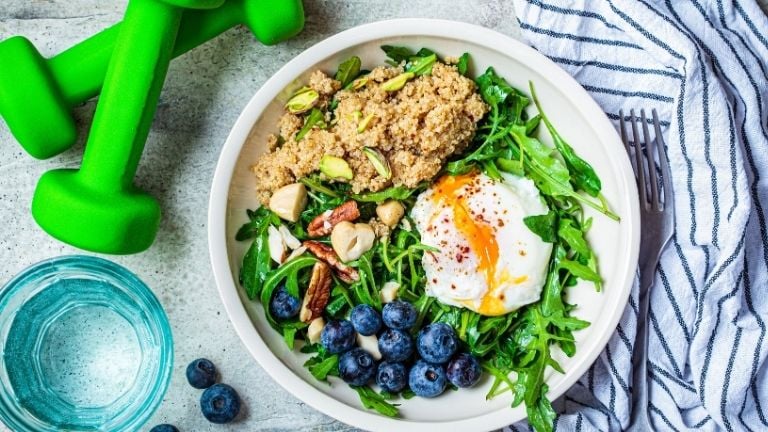
14. Avoid Overtraining to Prevent Injuries and Burnout
It is commonly believed that the more we exercise, the better it is for us since we burn more calories. However, too much training, especially cardio-based exercise such as running and spinning, can increase your cortisol levels, leading to weight gain.
While brief bouts of exercise do boost metabolism, very long or intense workouts paradoxically can increase hunger and overeating, especially if you are already stressed.
Moderation is key. You should monitor your hunger and food intake after intense sessions. Make sure you aren’t overtraining and fuelling properly after workouts.
Lifestyle Changes To Speed Up Lose Weight
Losing weight requires more than just eating right and exercising. To get results faster, consider these lifestyle changes that can help you.
Making small changes to your daily routine and surroundings can make a big difference in your ability to lose weight. Use one or two of these strategies at a time until you feel comfortable with them. Then add another.
Bit by bit, build the lifestyle framework that makes healthy choices easy and automatic.
1. Get Sufficient Sleep for Improved Energy, Mood, and Weight Loss
The study has shown that sleep loss can disrupt the regulation of energy balance and contribute to weight gain and obesity.
When you don’t get enough sleep, your body produces more ghrelin, which triggers hunger and cravings for sugary and high-calorie foods.
Lack of sleep can also lead to fatigue, making it harder to stick to an exercise routine.

2. Start Your Day With Water
When you get up in the morning, drink a glass of water. This will help your body get going because it won’t fight dehydration. Also, after you drink a glass of water, you won’t need to eat such a large breakfast.
A glass of water stimulates your body’s digestive juices and helps keep them well lubricated.

3. Think Before Eating To Make Mindful Choices
Be intelligent about what you eat. Don’t eat to eat. Animals eat instinctually; people eat when they know their body needs it. Don’t be an impulse eater.
Focus on the process rather than the outcome, allowing you to select foods that are more healthful.
4. Manage Stress Levels
Stress can influence appetite and food intake. Some individuals may experience increased cravings for high-calorie, sugary, and fatty foods during stressful periods.
Chronic stress is linked to insulin resistance, which reduces cells’ responsiveness to insulin. This can result in higher blood sugar levels, weight gain, especially around the abdomen, and an increased risk of developing type 2 diabetes.
Incorporate stress-reducing activities into your routine, such as meditation, deep breathing exercises, or engaging in hobbies that bring you joy.

5. Stay Positive for Improved Motivation and Mental Health
Staying positive and maintaining a positive attitude is crucial for weight loss and overall health.
When you’re feeling negative or stressed, it can be harder to make healthy choices and stick to your goals.
Additionally, a positive attitude can help to reduce stress, improve mood, and boost self-esteem.
6. Breathe Deeply for Full-Body Health Benefits
Natural methods stimulate the body’s healing resources and direct them towards health and balance. It can help increase energy, focus, and motivation and can be performed anywhere as a daily exercise.
Deep breathing can also be used to manage cravings and deal with low-energy states that result from toxemia and anxiety.
How you habitually breathe can be used to improve various conditions simply by improving breathing.

7. Limit Alcohol Intake to Reduce Empty Calories
If you can say no to alcohol, then that is best. Alcohol beverages are not exactly good for you. Although a glass of red wine does have heart benefits, most are just fattening. Beer is incredibly fattening.
Cocktails are fattening depending on what they are made of—for instance, whiskey and Coke. Also, most people get the munchies after a few drinks, and when you’re feeling a little drunk and hungry, you won’t be able to make good decisions about your diet. The overall combination is just not a good one.

8. Avoid Frying the Food
Instead of cooking things in oil or fat, bake them. Baking does not require all the fat and oil that frying requires, and your food is not soaking in those substances while it cooks.
For instance, a small baked potato weighing 138 grams (g) contains 128 calories and 0.18 grams of fat, whereas a similar quantity of french fries weighing 138 grams contains 431 calories and 20 grams of fat.
When cooking with oil, use a good Extra Virgin Olive Oil. It is more expensive than vegetable oil, but the health benefits are much better and worth the cost.
Know The Calories In Food Items And Dishes

9. Don’t Be Couch Potato
Spending excessive time sitting on the couch watching TV or at the computer can undermine weight loss efforts. It is fine to relax occasionally, but it is better to make it a habit to limit screen time and get active instead.
The key is striking a balance – be mindful of leisure screen habits and ensure necessary computer workstations support proper posture and comfort. Minor changes to your environment can help you stay active and shed pounds.

10. Stand Up And Walk To Reduced Sedentary Behaviour
If you have a job where you sit the whole time, stand up, and stretch every hour. Nowadays, most jobs require you to sit in front of a computer. If you have a job like this, try to move occasionally.
Walk around while you’re on the telephone. You’ll get a good workout if it is a long conversation.
11. Burn Extra Calories by Using Stairs Over Escalators
Take the stairs whenever you come across them in public places like malls, train stations, airports, etc. Stair climbing can help build stamina, strengthen bones and muscles, and tone the body.
It can also help you burn calories, lower the risk of multiple diseases, and help you keep a healthy weight.

12. Quit Smoking to Improve Your Lung Health
Quit smoking. Smoking does not contribute to your weight exactly, but it does lead to erratic eating behaviors and increases Nicotine and caffeine dependence.
This addiction can lead to numerous health problems, including increased cancer risk, respiratory illness, heart disease, infertility, etc. The best thing to do is stop smoking as soon as you can.

13. Dine Early for Better Digestion and Restful Nights
Avoid eating your last meal late at night or right before bed. Instead, aim to eat dinner around 7 pm, leaving 2-3 hours before sleeping.
Eating earlier makes the overnight fast last longer, giving more time for fat-burning processes like ketosis.
Establishing an earlier eating schedule helps condition your body circadian rhythms so that your digestion aligns with other biological processes.
14. Cut Down Artificial Sweeteners To Improve Gut Health
Don’t be fooled by products that claim to have ‘no added sugar’. Often, this sugar has been replaced with artificial sweeteners.
Research has shown that sweeteners will not only keep your taste buds sweet, which will make you crave sugar more, but they can also make you feel hungry and eat more food.

Best Habits That Help You To Lose Weight
Losing weight comes down to more than just diet and exercise. It is important to adopt helpful habits that support your weight loss journey. Small changes to your daily routines, mindset, and behaviors can make a significant difference.
This section will share the best ways to lose healthy weight and last a long time. The shared strategies will help you eat better, move more, and set up rituals to help you reach your body goals.
1. Create a Smart Grocery List for Healthier Choices
Having a grocery list can help you stay focused on healthy weight-loss choices. Before shopping, write down the items you need and your meal plan for the week. Include plenty of lean proteins, fruits, vegetables, whole grains, beans, nuts and healthy fats.
Instead of buying cookies, chips, or other processed snacks, buy whole grain crackers, plain yogurt, hummus, or mixed nuts.
These small changes can make a big difference.

2. Do Meal Planning To Staying on Track and Eat Nutritious Meals
Meal planning is a great way to control your diet. It involves planning your meals for a week or more and preparing the ingredients and/or food ahead of time.
This will help you prepare healthy meals, so you won’t eat unhealthy food when hungry.
To begin meal planning, decide what dishes you want to eat for the week. Then, check out recipes to get an idea of your desired ingredients. Make a grocery list of all the ingredients you need, and avoid unhealthy foods.

3. Avoid Impulse Snacks by Planning Ahead
Everyone loves snacks, and being reluctant to give up your favorites is understandable. However, most snacks are high in calories, fat, and sugar, which can sabotage your weight loss goals.
You don’t have to eliminate snacks altogether, but reducing your intake and making healthy choices is important.
One way to do this is to plan your snacks ahead of time. This will help you avoid eating unhealthy foods when you’re hungry or tempted by unhealthy snacks.
4. Have Occasional Treats to Satisfy Cravings and Stay Motivated
It’s unrealistic to expect yourself to have a perfect diet that eliminates all unhealthy foods. Actually, aiming for perfection can be counterproductive because it can lead to feelings of deprivation and depression.
Instead, finding a balance that allows you to enjoy your favorite treats occasionally is important.
A few ice cream scoops or a cake slice won’t hurt your diet. But it is important not to make these occasional treats a regular thing.

5. Journaling Can Help You Track Your Progress, Identify Triggers
In addition to a personal journal, keeping a public weight loss journal can provide extra motivation and accountability. Sharing your journey publicly creates a sense of responsibility to stick to your plan.
Knowing that others are watching you and rooting for your success can give you the extra push you need to make good choices and stay on track.

6. Conquer Cravings with Healthy Alternatives
One of the biggest challenges of losing weight is overcoming cravings. Humans are wired to love food, and it’s no surprise that many of us live to eat.
However, sometimes you get cravings even when you are full. These cravings are not actually cravings but just boredom or emotional pain. People eat food when they feel sad, frustrated, angry, or even when they are bored.
To curb emotional eating, redirect the mind and body. Go for a walk, call a friend, practice breathing exercises, drink some tea, or engage in a hobby.
7. Drink Your Coffee Black
If you love coffee and want to lose weight, switch to black coffee. It’s a small change that can make a big difference.
Regular coffee is high in calories, especially if you add milk, sugar, and other condiments. A single cup of sugar-laden coffee with milk can have nearly 600 calories.
Black coffee, on the other hand, is virtually calorie-free. It also contains chlorogenic acid, which can help slow down glucose production and reduce fat cell production.
Many people like to drink black coffee before they go to the gym to boost their energy and speed up their metabolism.

8. Embrace Patience for Lifelong Wellness
Many people start their weight loss journey eager to see results quickly. But it is important to wait and work on making changes that will last a long time. Real weight loss takes time.
There will be ups and downs along the way. You may have days when you go off track and eat unhealthy foods. Forgiving yourself and getting back on track the next day is important. Don’t let small setbacks derail your progress.
Your healthy dietary changes will slowly but surely lead to long-term weight loss.

9. Transform Your Mindset, Transform Your Health
Remember that losing weight is not only about your physical body. It’s also about your state of mind.
If you want to lose weight and keep it off, you must believe you can do it. You need to believe that you are worthy of a healthy body. You need to believe that you deserve to feel good about yourself.
It can make you stronger, more confident, and more in tune with yourself.
10. Stay Consistent With Your Plan
While occasional indulgences are acceptable, staying consistent with your diet choices will ensure long-term success in your weight loss journey.
Even though progress is slow, if you keep working hard and keep moving forward, you will continue to reach your goals.
Don’t try to overhaul your entire diet and exercise routine overnight. Start by making small changes that you can keep over time.
11. Make Informed Choices by Reading Labels
You can make informed decisions about the foods you eat by examining the serving size, calories, fat, protein, fiber, and other ingredient. Avoiding negative nutrients, unhealthy ingredients, and misleading claims can help you make healthier choices.
Reading food labels can be a bit confusing at first, but it gets easier with practice. Follow these tips to learn how to read food labels and make smart choices about what you eat and drink.
- Low in calories
- Low in saturated fat
- Low in trans fat
- Low in added sugar
- Low In Salt
- High in fiber
- High in protein
- More natural Ingredients
- Provide Good Level Vitamins & Minerals
- % Daily Value
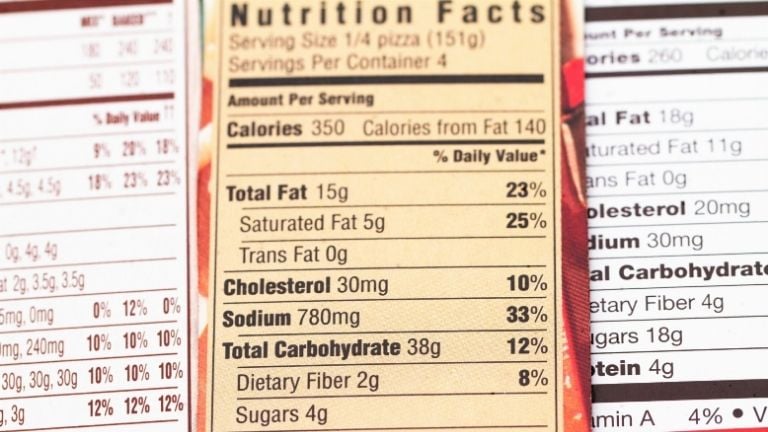
12. Plan a SMART Goal for Clear Direction and Motivation
Simply wanting to lose weight is not enough. You need to set a SMART goal to achieve it. SMART stands for specific, measurable, achievable, relevant, and time-bound.
- Specific: For example, instead of saying, “I want to lose weight,” say, “I want to lose 10 pounds in 3 months.”
- Measurable: A measurable goal has a quantifiable metric to track your progress against. For example, you could track your weight loss in pounds, inches, or body fat percentage.
- Achievable: You can realistically achieve an achievable goal within your given timeframe.
- Relevant: A relevant goal is one that is important to you and aligns with your overall health and fitness goals.
- Time-bound: A time-bound goal has a specific deadline. Months and Weeks.
Want To Know Your Body Fat %: Use Our FREE Body Fat percentage Calculator

13. Make It Fun and Enjoyable
Losing weight shouldn’t feel like a chore. You can also have fun while doing it. For example, you can invite your friends to try healthy meals the next time you hang out.
You can also turn exercise into a social experience and do it with your family and friends. You can even add some friendly competition to your workouts.
If you have always wanted to dance, try to pick up a dance form that is peppy, fast, and involves a lot of body movements.
14. Use Tools and Gadgets to Help You To Lose weight
Modern tools and gadgets can help make the weight loss journey more structured, enjoyable, and efficient.
- Fitness Trackers: Devices like Fitbit or Garmin monitor steps, calories burned, and even sleep patterns.
- Smart Scales: These scales measure weight and provide data on body fat percentage, muscle mass, and metabolic rate.
- Calorie Counter Apps: Apps like MyFitnessPal allow users to log food intake.
- Meal Prep Gadgets: Devices like air fryers or instant pots can help prepare healthier meals easily.
- Workout Apps: Platforms like 7 Minute Workout or Nike Training Club offer guided exercises suitable for various fitness levels.
- Heart Rate Monitors: They help in measuring exercise intensity and ensuring workouts are effective.
- Smart Journals: Digital journals can help track food intake, emotions, and progress, providing insights into personal habits and triggers.
- Recipe Apps: Platforms like Yummly offer healthy recipes based on dietary preferences or restrictions.

15. Stay Motivated by Celebrating Small Victories
When you achieve a goal, reward yourself with something you really want, such as a new piece of fitness gear, a massage, or a night out with friends. Some people even treat themselves to a small portion of their favorite unhealthy food.
Celebrate your achievements because it gives you something to look forward to and helps you stay motivated.
However, if you’re going to treat yourself to your favorite food, be mindful of the portion size. Don’t overindulge; remember that this is a treat, not a feast.
16. Stop Making Excuses and Take Charge of Your Health
People often say they don’t have enough time or find it hard to lose weight. However, these excuses are primarily psychological and can be overcome.
Excuses are double-edged swords – they prevent you from taking action now and can psychologically ruin future routines.
Reduce your inner excuses, find ways to stay positive, and take steps each day to get closer to your goals, no matter how small.

17. Ask yourself why you’re eating
Emotional or stress eating means eating more food even when you’re not hungry. This happens when you’re tired, upset, or bored. This habit typically emerges at night when willpower is lower.
If late-night cravings strike, pause and ask yourself if you’re truly hungry or just eating to feel better. A non-food alternative, like taking a relaxing bath, calling a friend, practicing yoga, or going to bed early, often works better than empty calories.
Before you snack out of habit or a temporary mood, check in with your body’s actual hunger signals.
Natural Supplements That Can Help To Lose Wight
While a balanced diet and regular exercise are the most effective ways to boost your metabolism, there are also several supplements that can help.
Some common metabolism-boosting supplements include:
1. Caffeine: Boost Your Metabolism and Improve Your Exercise Performance
Caffeine is a natural stimulant that can help increase metabolism and improve exercise performance. It is found in coffee, tea, and certain supplements.
However, it is important to consume caffeine in moderation. Be aware of the possible consequences of drinking excessive amounts of caffeine, such as jitteriness, increased heart rate, and interrupted slumber.
2. Accelerate Fat Burning with Green Tea Extract
Green tea extract contains compounds like catechins and caffeine, which have thermogenic effects.
These compounds can increase the body’s metabolic rate and the rate at which it burns calories, leading to enhanced energy expenditure.
Some studies suggest that green tea extract may particularly impact reducing abdominal fat.
3. Capsaicin for Enhanced Calorie Burning
Capsaicin, found in chili peppers, is believed to have a thermogenic effect, increasing metabolism and fat burning.
In this post hoc analysis, results suggest potential benefits of capsaicins (CAPs) on body fat and fat mass.
Some supplements contain capsaicin or capsaicinoids derived from peppers, but their effectiveness in promoting weight loss is still under investigation.

4. Target Stubborn Fat with Forskolin
Forskolin is derived from the plant Coleus forskohlii and has been marketed as a weight loss supplement. It may increase the production of a cyclic AMP molecule, which could affect metabolism.
However, more research is needed to establish its effectiveness and safety.
5. Conjugated Linoleic Acid (CLA)
CLA is a type of fatty acid found in meat and dairy products. As a supplement, it has been shown to enhance fat burning and metabolism.
While some studies suggest potential benefits, the overall evidence is mixed, and the effects may be modest.
6. How Vitamin B-Complex Fuels Your Day
Includes B vitamins such as B1 (thiamine), B2 (riboflavin), B3 (niacin), B5 (pantothenic acid), B6 (pyridoxine), B7 (biotin), B9 (folate), and B12 (cobalamin).
They help convert food into energy and support the functioning of enzymes involved in metabolism.
Eating whole grains, lean meats, poultry, fish, nuts, seeds, and leafy greens can provide an adequate intake of B vitamins.
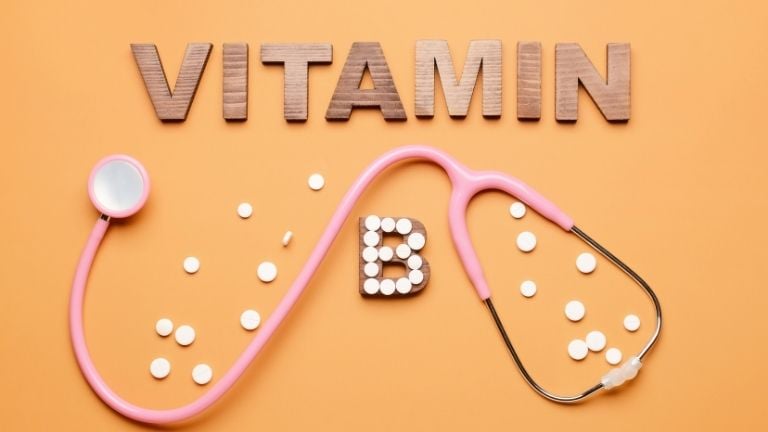
7. Regulate Hunger Hormones with Vitamin D
Adequate vitamin D levels have been associated with improved weight loss and metabolic function. Vitamin D deficiency has been linked to obesity and insulin resistance.
Research shows that vitamin D may help people with diabetes control their blood sugar and improve their insulin resistance.
Include vitamin D-rich foods like fatty fish, fortified dairy products, and egg yolks in your diet, or take a vitamin D supplement.
8. Reduce Fat Storage with Vitamin C
It acts as an antioxidant and supports carnitine production, a compound involved in fat metabolism.
It also assists in absorbing iron, which is essential for energy production. Adequate vitamin C levels may help optimize fat oxidation during exercise.
Fruits such as citrus, berries, kiwis, peppers, and leafy greens are excellent sources of vitamin C.
9. Vitamin E: Protect Against Cell Damage, Reduce Inflammation
Vitamin E is another antioxidant that helps protect cells from oxidative stress. It may also support energy production and metabolism.
Nuts, seeds, vegetable oils, spinach, and broccoli are good sources of vitamin E.
10. Magnesium: A Natural Muscle Relaxant and Energy Booster
Magnesium is not a vitamin but an essential mineral that contributes to hundreds of enzymatic reactions in the body, including ones involved in energy production and metabolism.
Adequate magnesium levels have been associated with improved insulin sensitivity and better metabolic health.
Eat magnesium-packed foods like whole grains, nuts, seeds, legumes, and green veggies to boost your health.

11. Boost Energy and Prevent Anemia with Iron
Iron is essential for producing hemoglobin, a protein that transports oxygen to cells for energy production. An iron deficiency can lead to fatigue and a reduced metabolic rate.
Including iron-rich foods like lean meats, seafood, beans, lentils, spinach, and fortified cereals can help maintain healthy iron levels.
Office Activities That Help To Lose Weight
When trying to lose weight, the office may seem like an unlikely place to get active. However, there are many easy ways to increase your daily movement through office-friendly activities.
Including small bouts of activity throughout your workday can make a difference in your weight loss efforts over time. This section will talk about exercises, habits, chores, and routines that can get your body moving more while you’re at your desk.
With a little creativity, the office can be a great place to burn extra calories and help you reach your weight loss goals.
1. Boost Productivity with an Ergonomic Setup
Ergonomic chairs, standing desks, and other ergonomic equipment can help you stay active and burn calories while working.
A comfortable workspace can reduce fatigue, allowing more energy for physical activities.
You are more likely to be productive when you are comfortable and focused. It can help you improve your focus and productivity by reducing distractions and discomfort.
2. Lunch Break Walk for Improved Energy and Weight Loss
A daily lunch break walk is an effortless way to increase your activity and burn extra calories. Rather than sitting down to eat, use your full lunch hour to walk outside.
Walking for 30 minutes at a comfortable pace can burn around 100 calories. Plan a walk together after lunch if your coworkers are also trying to lose weight.
Walking during your lunch break is a simple and effective way to get active.

3. Set Water Reminders for Regular Hydration
Setting a water reminder can encourage you to drink more water and avoid dehydration.
Studies suggest that drinking water can help with weight loss in various ways. It may suppress your appetite, boost your metabolism, and help you to burn more calories throughout the day.
It can also help you eliminate toxins in your body and boost your energy.
To stay hydrated, females need around 9 cups of water daily, and males need around 13 cups.

4. Posture Check for Reduced Pain and Improved Confidence
Although good posture may not directly lead to significant weight loss, it can contribute positively to general health.
Good posture allows your lungs to expand fully, providing more oxygen to your body and burning more fat.
You can set reminders on your phone, watch, or computer to go off every 30-60 minutes and remind you to adjust your posture. Roll your shoulders back and down while sitting or standing upright.
5. Team Up for Health: Join Office Sports Teams
Joining a recreational sports league at work is a fun way to get active with colleagues while pursuing weight loss goals.
Many companies offer opportunities to participate in softball, basketball, volleyball, soccer, and other team sports throughout the year.
Playing for just one to two hours per week can burn significant calories and build fitness. The social motivation also helps you stick with it. You should join one lunchtime or after-work sports team per season.

6. Burn Calories and Strengthen Legs by Stair Climbing
Stair climbing is a simple yet potent activity with several health benefits, weight loss being a primary one. Just 2-3 minutes of stair climbing can burn over 30 calories.
Over time, these small bursts of calorie burn add up. Aim to take the stairs instead of the elevator whenever you can. At work, find excuses to walk up and down.
Regular stair climbing can increase your metabolic rate, which in turn can help you burn more calories even at rest.
7. Healthy Snacking for Improved Nutrition and Reduced Cravings
Healthy snacking at the office helps control hunger, maintain steady blood sugar levels, and prevent overeating at meal times.
Good snacks prevent impulsive, high-calorie choices and keep your willpower strong. Just be sure to limit yourself to one snack serving between meals.
Many smart options include fresh fruits and vegetables, plain Greek yogurt, mixed nuts and seeds, and protein bars with limited sugar.
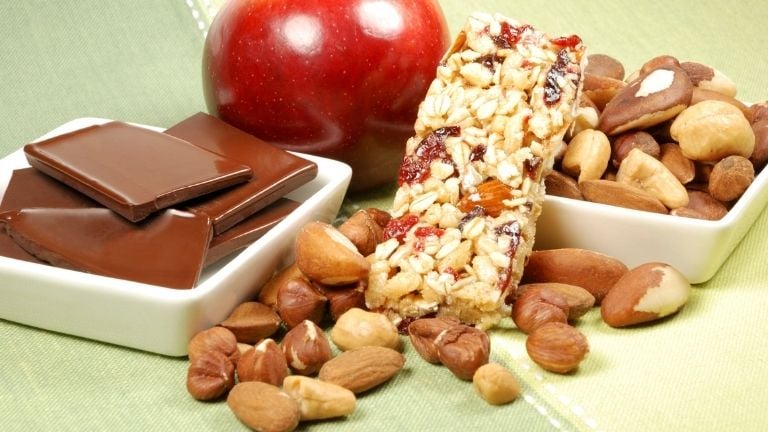
8. Relieve Tension with Desk Yoga Techniques
Chair yoga is a low-impact form of yoga that can be done while sitting in a chair. It can help you build strength, flexibility, and balance, which will help you lose weight.
Certain yoga poses can improve digestion and relieve issues like bloating.
Simple stretches like neck rolls, cat-cow stretch, seated forward bend, seated eagle and seated spinal twist can be done at your desk to help improve flexibility and reduce stress.

9. Using Standing Desk To Improve Circulation
Standing desks are becoming more popular in recent years, and for good reason. According to research, standing burns more calories than sitting. , Using a standing desk can help you burn up to 170 calories more per day.
Sitting for a long time can lead to insulin resistance. The use of a standing desk can improve insulin sensitivity and regulate blood sugar levels
Standing uses more muscles than sitting, improving muscle tone and strength.
10. Bike to Work To Improve Cardio Health
Cycling to work is a great way to keep fit and healthy throughout the day. It is a low-impact activity, so it is easy on your joints. It is also a relatively efficient way to travel.
The Harvard Health Letter says that a person who weighs 155 pounds can burn 298 calories in a 30-minute bike ride. They need to pedal at a speed of 12 to 13 miles per hour.
Regular cycling can increase your metabolic rate. In addition to strengthening the cardiovascular and respiratory systems, it can reduce the risk of cardiovascular disease.
It’s also a good way to help you shed extra pounds. That’s because you can burn many calories when you pedal, especially if you go faster than normal.

11. Walk and Talk
Convert phone calls into active time. Walk around inside or outdoors while catching up with friends and family.
Walking and talking can help to reduce stress and improve your mood. It is a great way to clear your head and de-stress after a long day.
Set a minimum-minute goal for a walk and talk time per day or week to ensure you meet activity targets.
12. Opt for Walking Meetings
Instead of sitting in a conference room, consider taking a walking meeting. Even a 10-15 minute walk makes a difference.
Schedule walking meetings right before or after lunch to aid digestion and regulate blood sugar levels.

Conclusion
Losing weight and keeping it off requires a multi-step approach. While no single strategy will guarantee success, implementing a combination of nutrition, exercise, and lifestyle changes can get you to your goal faster and more sustainably.
Remember that small steps make a big difference over time. Focus on adding one healthy habit at a time until it sticks, then build upon it. Celebrate non-scale victories like boosted energy, better sleep, and pride in your discipline.
This guide provides you with powerful tools to take control of your health. Now, the final step is consistency and commitment.
Keep your end goal in sight, take it day by day, and don’t forget to enjoy the rewarding journey.
References
- Dalen J, Smith BW, Shelley BM, Sloan AL, Leahigh L, Begay D. Pilot study: Mindful Eating and Living (MEAL): Weight, eating behavior, and psychological outcomes associated with a mindfulness-based intervention for people with obesity. Complementary Therapies in Medicine 2010;18:260–4.
- Vujović, N., Piron, M. J., Qian, J., Chellappa, S. L., Nedeltcheva, A., Barr, D., Heng, S. W., Kerlin, K., Srivastav, S., Wang, W., Shoji, B., Garaulet, M., Brady, M. J., & Scheer, F. A. J. L. (2022). Late isocaloric eating increases hunger, decreases energy expenditure, and modifies metabolic pathways in adults with overweight and obesity. Cell Metabolism, 34(10), 1486-1498.e7.
- Allison KC, and Goel N. (2018). Timing of eating in adults across the weight spectrum: Metabolic factors and potential circadian mechanisms. Physiology & behavior 192, 158–166
- Lopez-Minguez, J., Gómez-Abellán, P., & Garaulet, M. (2019). Timing of Breakfast, Lunch, and Dinner. Effects on Obesity and Metabolic Risk. Nutrients, 11(11), 2624.
- Peeke, P. M., Greenway, F. L., Billes, S. K., Zhang, D., & Fujioka, K. (2021). Effect of time restricted eating on body weight and fasting glucose in participants with obesity: results of a randomized, controlled, virtual clinical trial. Nutrients and Diabetes, 11(1), 6.
- Boreham, C. A., Kennedy, R. A., Murphy, M. H., Tully, M., Wallace, W. F. M., & Young, I. (2007). Training effects of short bouts of stair climbing on cardiorespiratory fitness, blood lipids, and homocysteine in sedentary young women. British Journal of Sports Medicine, 39(9), 590-595.
- Loftin, M., Waddell, D. E., Robinson, J. H., & Owens, S. G. (2010). Comparison of energy expenditure to walk or run a mile in adult normal weight and overweight men and women. Journal of Strength and Conditioning Research, 24(10), 2794-2798

Manish is a NASM-certified fitness and nutrition coach with over 10 years of experience in weight lifting and fat loss fitness coaching. He specializes in gym-based training and has a lot of knowledge about exercise, lifting technique, biomechanics, and more.
Through “Fit Life Regime,” he generously shares the insights he’s gained over a decade in the field. His goal is to equip others with the knowledge to start their own fitness journey.
